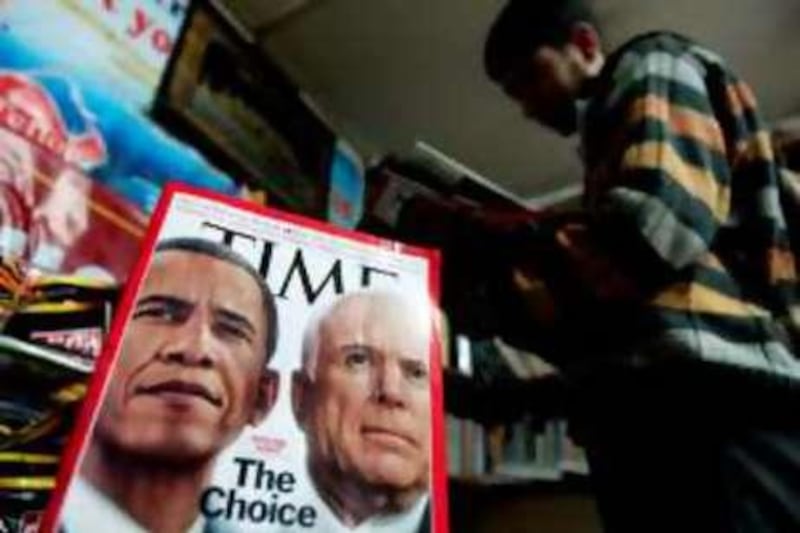While it was unclear at press time whether Barack Obama or John McCain would be its beneficiary, one thing is certain: rarely has there been so dark a presidential inheritance. But get beyond the two-front war, the global financial crisis, and the collapse of US credibility abroad, and you have the economic opportunity of a lifetime. For one thing, the new president will begin his term when the world economy has little place to go but up. Ronald Reagan, Bill Clinton, and President George W Bush each assumed the helm at a time of economic weakness and were swept to a second term in the slipstream of revived growth. Between now and his 2012 re-election bid - assuming an aged Mr McCain opts for another run if he was to win this time - the new president could not only revive the US economy, he could right the global current account imbalance. This is a job that requires a cheap dollar, a strong Chinese yuan, political backbone and no small amount of providence.
Having declined gradually against the euro and yen for years, the dollar has rebounded due to the perception of the US currency as a safe haven as well as the unwinding of carry trades, in which investors borrow in currencies made cheap by low interest rates to invest in higher-yielding ones. As those positions are liquidated, the dollar will reverse itself as the engine of global growth is transferred from US consumers to Asian ones.
For much of the past decade, the US economy was driven by Americans borrowing against the value of their homes. With the collapse of the property market, homeowners owe more than their houses are worth, which inhibits spending amid darkened retirement prospects for a nation that saves 2 per cent of its earnings. As personal consumption accounts for some two-thirds of US GDP, recession - possibly deep and prolonged - is unavoidable.
Here's where the next president will have to resist the innate bias of politicians for tactics over strategy. Tax cuts and additional stimulus packages could revive the US economy - assuming investors can look beyond a projected US$1 trillion (Dh3.67 trillion) budget deficit for next year, roughly twice its current size - which would revive spending levels and support the dollar. But that would only perpetuate America's dependency on imported capital, the same fix that fuelled the bubble that led to the crisis in the first place. However tragic the spectre of jobless Americans being forced from their homes, only a cheap dollar and cheap US exports can correct the country's massive trade imbalance. Exporting countries that once relied on the US consumer will then face a choice: devalue their currencies in a rush to the bottom as they did after the 1997-1998 economic meltdown, or stop buying dollar-denominated assets in favour of vigorous domestic spending. With the US economy sidelined and no prolific importer to take its place, devaluation makes little sense. That leaves stimulating demand at home.
Asia, with China at its epicentre, sits on the lion's share of the world's capital. Beijing alone manages $1.3 trillion in foreign exchange reserves, while personal consumption accounts for less than 40 per cent of GDP. The Chinese economy grew by 9 per cent in the third quarter, the first single-digit performance since 2005, in no small part because of the dwindling US appetite for its imports. Meanwhile, the demands on China's infrastructure are vast, and were becoming inflationary bottlenecks even before the financial crisis caught up with Asia. By investing in its own economy rather than US Treasury bills, Beijing can fuel demand-led growth by relieving those constraints - on roads, ports, and power grids, but also on service sectors like health care and finance. One reason why the Chinese savings rate is among the highest in the world is because of the country's inadequate pension system. Modernising it would encourage spending, particularly on imported goods.
Of course, a stronger Chinese yuan would enrage the country's manufacturers and bankers, who resisted its modest appreciation this year. But once it becomes clear that a Keynesian elixir is what is needed to keep the economy growing fast enough to absorb new entrants into the job market, service-sector industries will become increasingly assertive. The country's airlines, for example - among China's biggest importers - lobbied successfully for the yuan's revaluation early this year as the price of oil was nearing record highs.
A strengthening yuan is as pivotal to the balancing of global trade as is a cheaper dollar. In return, emerging markets like China should be allowed proportionate representation at the World Bank and International Monetary Fund, while the Group of Eight major industrial nations should be expanded to include China, Brazil, and India. The economic summit planned for later this month, hailed as Bretton Woods II, is the ideal forum to get that process started.
If it is true that in adversity lies opportunity, then in this winter of discontent there must be a real game changer. Let's hope America's new president-elect has the vision and courage to identify it. sglain@thenational.ae





